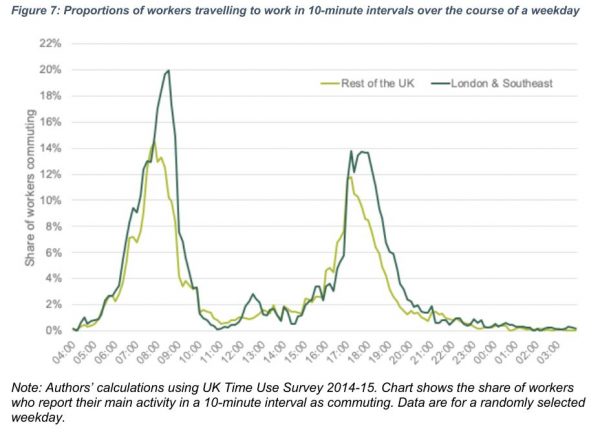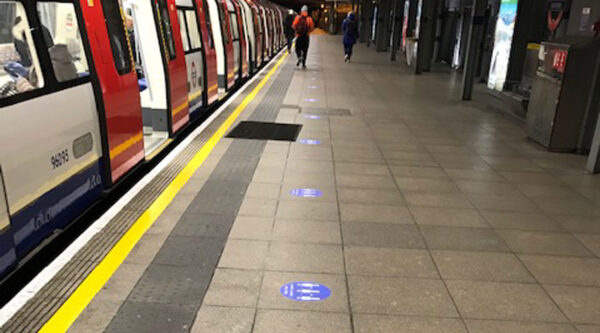Changes to how much people pay for their peak-hours commute could be considered as a way of encouraging people to commute at different times, according to a report from the Institute for Fiscal Studies (IFS).
The report says that in order to reduce crowding on public transport, there needs to be ways of encouraging both employers and employees to spread the commute over a wider time frame.
In normal times, as much as 20% of Londoners who travel by public transport do so at 8:30am. If that could be reduced by encouraging earlier or later starts, then crowding would be reduced. Not just good during the era of the virus, but a general good in of itself.
To use the phrase of the moment – we need to flatten the curve.
Knowing that sin taxes and incentives will change behaviour, the IFS suggests that TfL could “increase the relative price of commuting at peak times”.
This has the advantage of encouraging a shift in when people commute while slightly helping to repair TfL’s shattered finances. Pricing by time of rush-hour commute could include a return of something that used to exist a century ago — the workers fare — cheaper tickets offered to people who travelled to work early in the morning before the professional workers.
Your correspondent used to work for a company which had a start time of “between 8am and 10am”, with corresponding departure times, and it not only allowed people to commute to work when they preferred, it had the huge advantage of making meetings before 10am or after 4:30pm impossible, giving everyone a couple of hours of meeting-free work time.
Unless you wanted to deliberately exclude someone by scheduling a meeting for 8:30am, which your correspondent would never have done. Certainly not.
The IFS also suggests temporarily encouraging more people to travel by cars, by reducing fuel duties and congestion charges, although it also warns that such reductions tend to be much harder to reverse later on due to political lobbying.
London suffers from the problem that a far larger percentage of commuters rely on public transport, which raises the risk to commuters of catching the virus. However, it’s also balanced by the fact that an estimated 60% of workers could work from home, at least for some of the time.
While many employers were already encouraging some working from home before the virus struck, the lockdown will have forced many die-hard laggards to realise that it is possible to do this, at least some of the days of the week.
This is likely to have a long term impact on how people work in the future, with fewer people commuting every day, and many only going into the office a few days per week. The impact can be considerable. If half of commuters into central London worked from home one day per week, then that releases capacity on the London Underground equivalent to what Crossrail is promising to deliver.
More home working has good and bad news for public transport, as fewer commuters reduces the need for capacity upgrades, but also reduces the revenues needed to pay for essential maintenance and upgrades.
How TfL squares this particular circle is something to be looked out for in the next few months.









So IFS wants to reduce fuel duties and congestion charges at a time of record low oil prices well we know who’s side they are on … Tell them to get on their bike !
Mayor Khan has fulfilled his pledge not to increase fares during his 4 year term so he increases fares and breaks his promises! Well that’s how it will be presented next year given Mayoral election has been deferred by a year a fare increase next January maybe .
London is benefitting from record low air pollution and giving that away for one in a car brigade is a price not worth paying…..
Is it possible that moving a large proportion of workers to a night shift would work? Everyone working from nine to five seems rather crazy right now.
The health downsides would be considerable.
The issue of moving the peak isn’t really one of fares, it’s one of services. Outside peak the number of trains running is considerably less.
Take for example the TfL Rail service out of Liverpool Street*. During off-peak it’s a very reasonable 6 trains per hour. However, during the two peak hours it becomes a 14 trains per hours service – but only in the direction of flow.
If you wanted people to spread their travel outside these times you would need to find the drivers to drive the 8tph during the extended “peak hours” service. This would have to be done “inward” in the morning (9am to 11am) and “outward” in the evening (7pm to 9pm).
Of course, for TfL Rail this would mean a new mainline timetable which seems a hard ask.
Just making it more expensive (than it already is!) in the current peak won’t work without the extra trains running too.
* http://content.tfl.gov.uk/tfl-rail-liverpool-street-shenfield-timetable-15-dec-2019-to-16-may-2020.pdf
Another problem with moving the peak is that anyone who is a parent cannot reasonably adjust, unless the school opening hours are adjusted. So the parent will be forced to suffer higher peak fares simply because they have to fit in with the school hours.
(assuming schools/nursery/etc re-open, which they will have to for people to be able return to work)
I’m guessing I’m in the 60% who can continue to work from home. Work has sent an email about how they are going to ‘re-open the office’ but I cannot see how that will work when everyone comes in by public transport (train/tube) with the associated risks. Also they operate a zoned hot-desking policy, and that looks like one thing that will not be allowed when things re-open. So WfH it is – hopefully with schools reopened, when I have to do the childcare/teaching the work really doesn’t happen.
“Nudge” approach could also include/require peak time tickets to be PAYG only or PAYG supplement on top of travelpass, to encourage peopke review travel patterns regularly.
Although the Citymapper Pass approach would negate rhis. (The pass is really just contactless payment card with weekly discounted prepayment by direct debit for opted zones and daily settlement of excesse by direct debit)
I’d work from home more, but then there’s no point in a season ticket so costs go up. Crazy that the Thameslink Key card does not allow a carnet type system where I could buy 10, 20 or 30 journeys, not a week or a month.
Large numbers of office workers including most civil servants already have flexi schemes with start times as you mention, i.e. between 8am and 10am with corresponding departure times, but the vast majority will always cluster around the ‘normal’ time of 8:30 or 9am. Shifting that will be hard as it depends on the needs of the job as well as, as you say, staff commitments outside. But if Tfl were to consider peak pricing it would presumably need a wholesale change to their season ticket Ts&Cs; if I have a 4-zone annual for example, it is priced under the current model and will be used as such – it isn’t a pre-paid phonecard-type ticket that gets used up the more I travel or if I rie in peak times.
I am the proud possessor of a Freedom Pass, which I greatly value. However, I would be happy to do my bit by paying the normal fare at peak times, if I am determined to travel at that time.
Maybe there are “health downsides” to working nights, but that’s surely better than getting or spreading the virus?